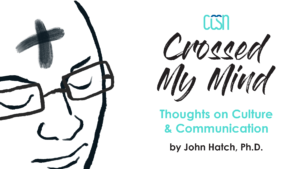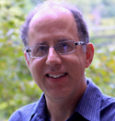 Column title: Crossed My Mind: Thoughts on Culture and Communication
Column title: Crossed My Mind: Thoughts on Culture and Communication
Column entry: “Finally, the Book on CRT I’ve Been Wishing For (Part 1)”
By John Hatch, Ph.D.
Eastern University (retired)
CCSN Senior Fellow
Column Description: As Christians, we are called to have the mind of Christ. This goes against the grain of our social and cultural conditioning. We seek personal or political advancement; Christ seeks the lost and the least. We grasp for cultural ascendency; Christ descends to the cross of love. This column is dedicated to thinking about culture and communication under the sign of the cross.
February 2025 / September 2024 / August 2024 / June-July 2024 / May 2024 / April 2024 / March 2024 | February 2024(2) / February 2024(1) / January 2024 / December 2023 / November 2023 / October 2023 / July 2023 / June 2023 / May 2023 / April 2023 / March 2023 / February 2023 / January 2023 / December 2022 / November(2) 2022 / November 2022 / October 2022 / August-September 2022 / June-July 2022 / January 2022 / December 2021 / October-November 2021
Finally, the Book on CRT I’ve Been Wishing For (Part 1)
It’s been a while since my last column. The election and the holidays led me to focus my energies elsewhere; but February being Black History Month has given me the push I needed to write an intended column on a new book about Critical Race Theory.
Last year, I published columns about two works by Christians addressing CRT. I found Romero and Liou’s Christianity and Critical Race Theory to be much more fair-minded and helpful than Baucham’s Fault Lines; however, I also felt that their book fell short as a Christian primer on Critical Race Theory. Where Baucham caricaturized CRT and mischaracterized the positions of some fellow Christian leaders, Romero and Liou mostly missed an opportunity to address the kinds of criticisms that conservatives like Baucham aim at CRT and didn’t really offer a comprehensive picture of CRT as a school of thought.
Thankfully, there is now a book that squarely faces the CRT debate with both grace and truth, while offering a primer on the subject. Published last summer by Intervarsity Press, Untangling Critical Race Theory: What Christians Need to Know and Why It Matters is a book I wish had been available five years ago, when certain pundits and political activists began turning “CRT” into a term of fear and derision. The book’s author, Ed Uszynski, not only has the academic credentials to write a book on this subject, but has also served in the world of evangelical ministry for decades, including Cru, Athletes in Action, and FamilyLife. Uszynski knows CRT, and he knows his audience. As stated in the introduction, his threefold purpose is to provide “a primer on CRT, a short history of the Marxism and Critical Theory from which it grew, and a practical investigation of what CRT’s concepts mean for the church.”[i] In this column, I’ll talk about his framing of Critical Race Theory in terms of the second topic; then, in the next installment, I’ll get into CRT itself.
The author wisely begins by retracing his personal journey into this topic as a white man, thus establishing identification with his audience of predominantly white evangelicals. He talks about growing up “in a conservative, middle-class home in a white neighborhood” on the edge of Cleveland while attending high school with “a racially diverse mix of kids coming from four sides of town and every stratum of socioeconomic reality.”[ii] He recounts being told by a black friend’s parents that he couldn’t take her to the prom (as they were concerned about what her church friends and others in the neighborhood might say). After becoming a Christian at college, Uszynski learned from the example of ministry leaders who taught him both to “prioritize the Word of God” and work across the racial divide.[iii] He also took classes on the black experience and the black church in America. After college, he served “as an evangelical minister, primarily using sports as a launching point into both black and white athletes’ lives.”[iv] He earned two master’s degrees at Trinity Evangelical Divinity School, and eventually entered a Ph.D. program in American culture studies at Bowling Green State University, where “a Marxist worldview” and “the completely new and foreign language of Critical Theory” provided the lenses for studying culture.[v] There he found himself as the lone “politically conservative, white, male, hetero, evangelical Christian in classes where each of those labels was anathema.”[vi] Yet rather than becoming defensive, he leaned deeper into Scripture, noticed where Critical Theory’s critiques of society intersected with God’s concern for justice, and recognized that Christ provides the solution to these problems in a way that Marx can never do.
Because he approaches secular theories with confidence in the gospel rather than fear of challenges to his faith, Uszynski is able to respond to their ideas with grace and truth. He neither resorts to caricatures nor uncritically embraces CRT. And rather than cherry-picking information, he tries to give a full and fair picture of his subject. This begins with presenting CRT in context: first, its roots in Marxian thought, and second, its origins in Critical Theory as a contemporary outgrowth of Marxism.
Chapter 2 offers both a brief primer on Marxism and a helpful model of Christian response. Although Uszynski sees Marx “as a Christ-less villain” whose words “fueled some of the most tragic scenes known to history,” he also notes that “reading Marx instead of his critics . . . surprised me. I found myself agreeing with many of his observations and insights about the way humans operate with one another in a capitalist system.”[vii] He realized that we do tend to put profit before people, treat them as means to an end, create false needs in order to sell them products, and foster ever-widening class divides while undermining human freedom—things that many biblical writers decry. Yet Marx “did a better job critiquing Capitalism than he did replacing it, and his solutions for the problems in his age only created worse problems in ours.”[viii] As a result, “The world doesn’t need more Marxists. It needs more Christians who see what Marx and his followers see, and who will courageously bring the gospel to bear on matters they’d rather ignore.”[ix] Our selfish desires and idols divert our attention from what the gospel challenges us to address; and “nowhere has a sloppy, knee-jerk rejection of ideas and people as ‘Marxist’ done more direct damage than in the conversation around race.”[x]
This brings us to Critical Theory—the trunk from which CRT sprouted. Uszynski devotes two chapters to this topic. He begins by identifying with his audience’s concerns: “I agree that CT should be chastised for its illiberal, cynical, and unredemptive vision of the world . . . it simply replaces one evil with another in the name of setting people free.”[xi] He then pivots to the opposite problem: many Christians either under-represent Critical Theory’s valuable insights or simply misrepresent what it says. While demonizing CT, they ignore the fact that “Capitalism, even if it produces a long list of positives, is still a godless ideology, unashamedly fueled by greed and the will to dominate,” and “Conservatism, while in many ways overlapping with and preserving Christian ideals, protects the interests of elites at the expense of everyone else.”[xii]
The body of chapter 3 gives a primer on Critical Theory as an adaptive response to the rise of communist and fascist dictatorships in the early to mid-20th century. Uszynski traces how scholars in the Frankfurt School shifted attention from the crushing weight of economic domination to the oppressive power of cultural ideology, broadening the concept of oppression “to include a poverty of spirit created by profit-driven, consumerist society and the bondage of humans to social and moral norms dictated by others.”[xiii]
While CT doesn’t recognize a God who entered history to transform humanity from the inside out, it does, like the book of Ecclesiastes, offer a hard-headed look at life “under the sun,” where human fallibility, folly, and selfishness undermine happiness. In chapter 4, Uszynski discusses the value of Critical Theory within this qualifying frame. Although CT lacks moral norms anchored in the Creator’s design, it recognizes the abuse of power, the corruptness of human culture, and the self-interest undergirding moral pretensions. People are drawn to Marxism and Critical Theory because they “provide a rationale for human angst and alienation;” “take power seriously;” “expose legitimate problems with Capitalism;” “take structural sin seriously;” and “speak on behalf of the mistreated, vulnerable, and oppressed.”[xiv] Seeking to promote human liberation (rather than Marxist-Leninists’ brutal revolution), critical theorists have lifted up the perspectives of those outside the norm: racial, cultural, and gender minorities. In this way, they laid the groundwork for the emergence of Critical Race Theory.
It all began in the early 1970s, when civil rights attorney Derrick Bell, after having won numerous school desegregation cases, came to “an unsettling realization: his efforts to desegregate schools fueled more race-driven maneuvering, and every advance seemed to be countered by groups of white folks working to reestablish racial hierarchy and segregation.”[xv] This realization “led him to troubling questions: Could racism be so deeply rooted in the American psyche that it would always find a way to reassert itself despite waves of reform aimed at eliminating it? What if racism and racial disdain were simply permanent features of American life?”[xvi]
My next column will look at how Critical Race Theory responds to these questions—and how Uszynski, in turn, responds both to CRT and Christians’ concerns about it.
* The views of any CCSN columnists are their own, and do not necessarily represent the views of the CCSN. We invite and embrace a wide range of views and critiques on important communication and cultural issues from a Christian perspective. The CCSN is a community of Jesus followers who study communication. We do not support or promote a particular social, political, or denominational agenda.
NOTES
[i] Ed Uszynski, Untangling Critical Race Theory: What Christians Need to Know and Why It Matters (Downers Grove, IL: 2024), 14.
[ii] Uszynski, Untangling Critical Race Theory, 21.
[iii] Uszynski, Untangling, 23.
[iv] Uszynski, Untangling, 24.
[v] Uszynski, Untangling, 26.
[vi] Uszynski, Untangling, 26.
[vii] Uszynski, Untangling, 41, 42.
[viii] Uszynski, Untangling, 36.
[ix] Uszynski, Untangling, 36.
[x] Uszynski, Untangling, 36.
[xi] Uszynski, Untangling, 45.
[xii] Uszynski, Untangling, 58.
[xiii] Uszynski, Untangling, 50.
[xiv] Uszynski, Untangling, 69-72.
[xv] Uszynski, Untangling, 82.
[xvi] Uszynski, Untangling, 83.

